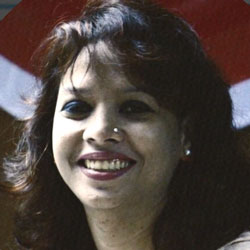

RESHAPING AGRICULTURE FOR BETTER NUTRITION –
The Agriculture, Food, Nutrition, Health Nexus
13-14 August 2018, Canberra

Dr Shamia Chowdhury

Shamia is a Nutrition Specialist with WorldFish, one of the Consultative Group on International Agricultural Research (CGIAR) centres, that harnesses the potential of fisheries and aquaculture to reduce hunger, ensure food security and alleviate poverty.
Shamia is a Dental Surgeon by background. She also has a Master of Public Health (MPH), and a Master of Science (MSc) from the Institute of Tropical Medicine (ITM) Antwerp, Belgium focused on Health System Management and Policy. Working towards improvements in maternal and child health has become her professional forte as well as personal area of interest. Being inspired to serve the underprivileged, she has shifted her profession from clinical practice to the development sector. Her last eight years of professional experience have provided her the opportunity to work with several respected international non-government organisations in Bangladesh, particularly in relation to health and nutrition.
Small fish, big impact: nutrition-sensitive fish agri-food systems in Bangladesh
Abstract
Jessica Bogard and Shamia Chowdhury
Fish plays a vital role in nutritional quality of diets in Bangladesh, especially for the poor. It is also inextricably linked to the culture of Bangladeshi people, and supports the livelihoods of more than 17 million people. Nutrient composition analysis has shown wide variability in the nutritional value of different fish species, with small indigenous fish species (SIS) being a particularly rich source of iron, zinc, calcium, vitamin A, vitamin B12 and other micronutrients, in comparison to commonly farmed species. Given widespread malnutrition issues in Bangladesh, there is significant opportunity for fish to play a greater role in contributing to improved food and nutrition security. WorldFish and partners have developed a package of approaches to maximise the benefit of fisheries and aquaculture for nutrition outcomes among vulnerable groups through nutrition-sensitive fish-agri food systems. These involve; inclusion of nutrient-rich SIS in pond polyculture systems, enhanced stocking of SIS in wetlands, integrated vegetable production on pond dykes and homestead gardens, simple processing of fish to improve suitability for consumption by infants and engaging women in fish harvesting to promote frequent consumption of SIS by women and children. These activities are supported by broader approaches including transforming norms, attitudes and practices around gender equity and social behaviour change communication for improved nutrition and hygiene practices. The integrated and multi-component nature of these approaches has shown numerous benefits for nutrition, gender equity, income, and livelihoods. Nutrition-sensitive approaches to fish agri-food systems are central to contributing to the Sustainable Development Goals in Bangladesh and beyond.